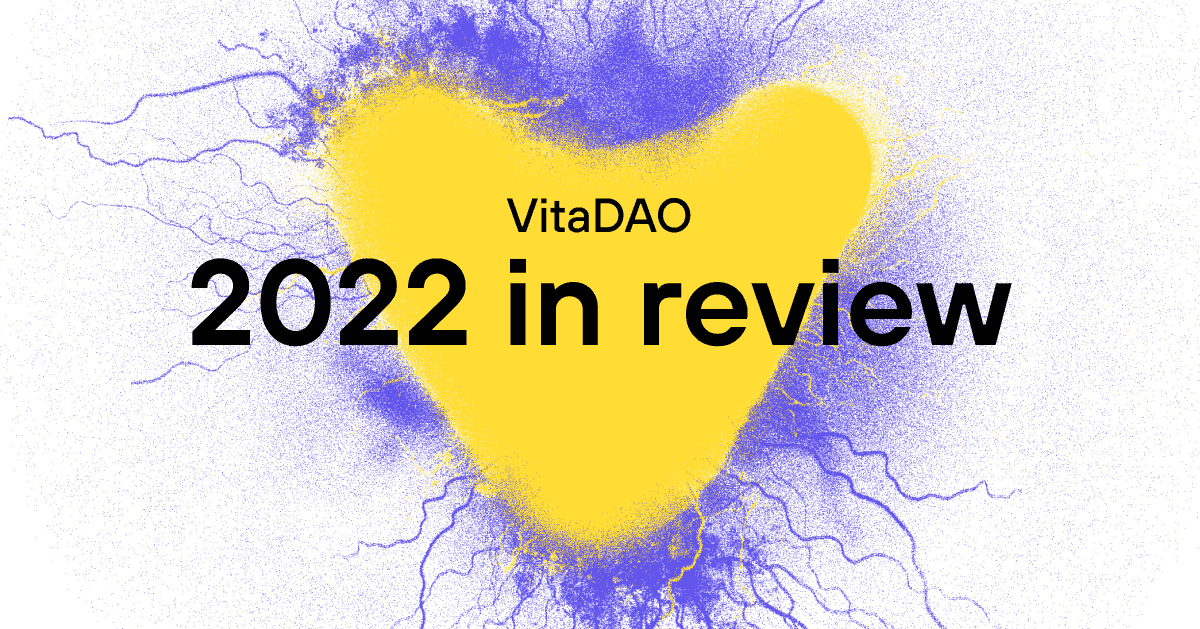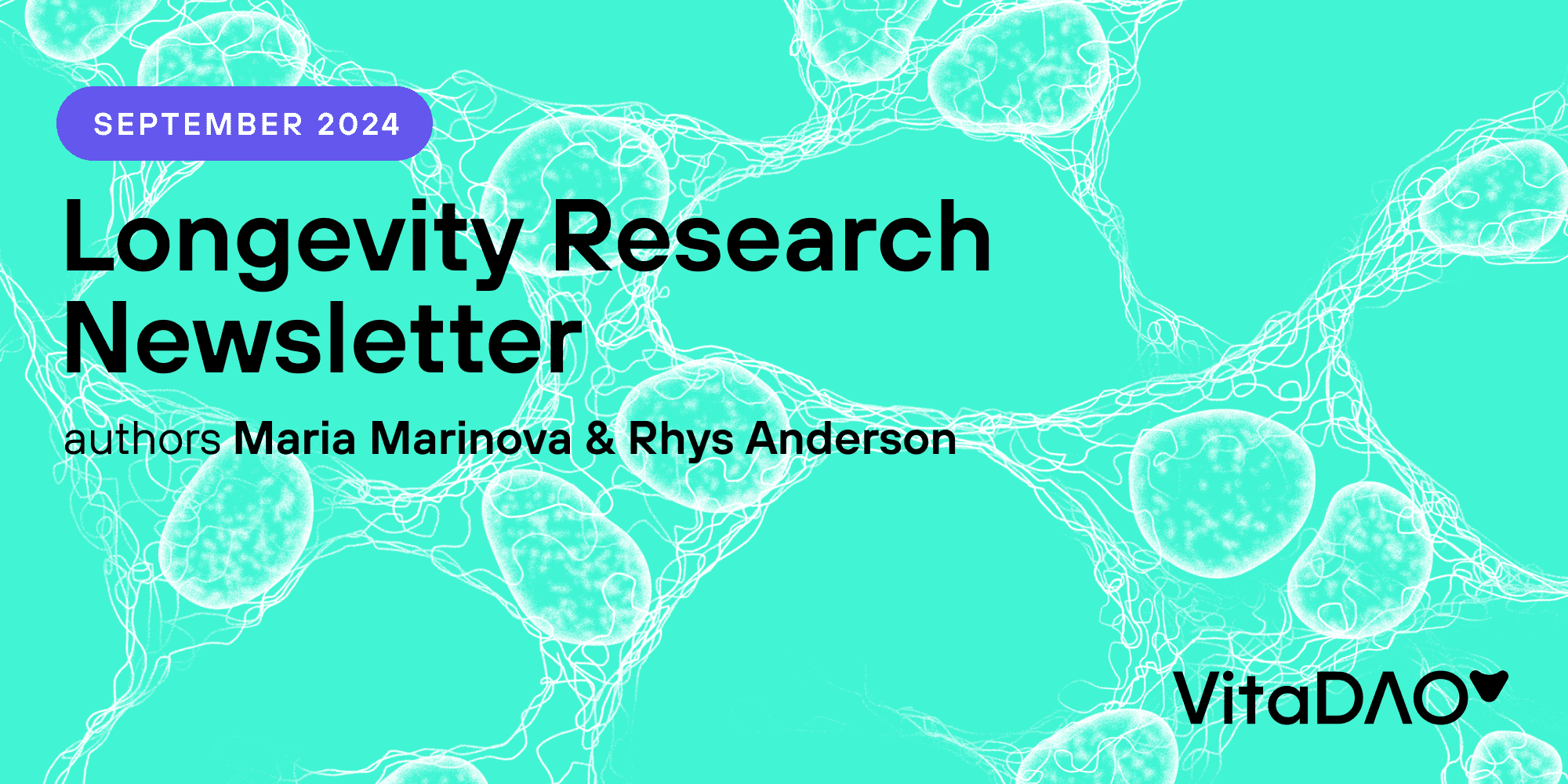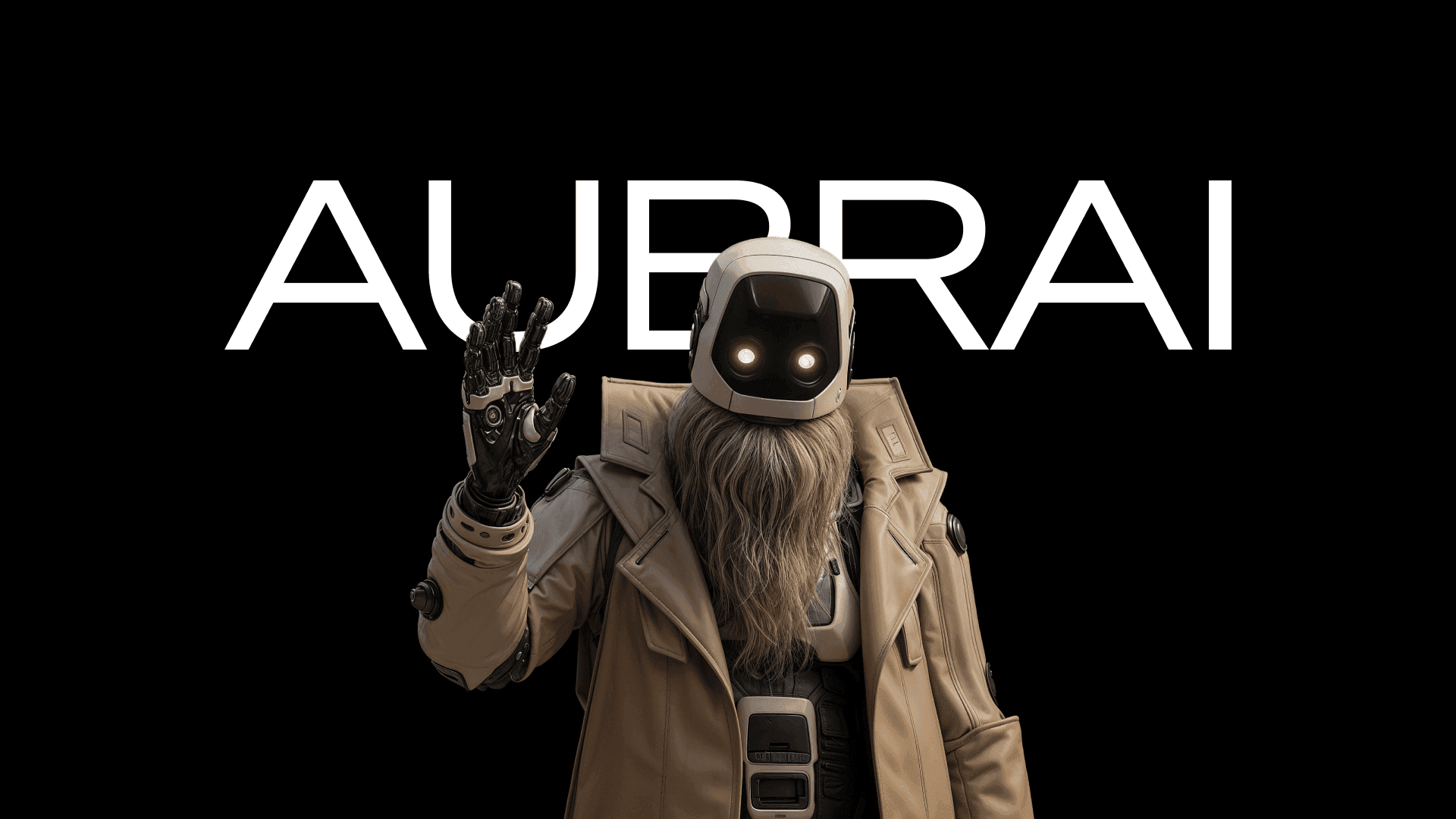
VitaDAO Letter: Year in Review + Interview with VitaDAO Co-initiator, Tyler Golato

VitaDAO Letter: Year in Review + Interview with VitaDAO Co-initiator, Tyler Golato
What a year it has been! 2022 was a year full of growth, science, and a whole lot of funded longevity research. In the 1.5 years since VitaDAO’s historic Genesis auction, VitaDAO has funded 15+ longevity projects, gathered 9000+ community members, and continued to lead the decentralized science movement. Here at VitaDAO, as a new year begins, we’re filled with gratitude. Travel with us as we highlight some of the craziness that was 2022!

New Here?
VitaDAO is a decentralized organization made up of individuals from across the globe working to fund early-stage aging research and spin out longevity biotech startups. VitaDAO is focused on maximizing healthy human lifespan.
In the coming year, we hope you’ll join our mission. Want to get involved in the longevity field? Contribute to VitaDAO and receive $VITA tokens in return. Join the VitaDAO community on Discord and stay up to date on Twitter! Want monthly updates on what’s happening at VitaDAO? Subscribe to this Newsletter to stay up-to-date.
2022 in Review
Below, read about what went DAOn in 2022. Buckle up! Even though this is not an extensive list, it’s still a lot!
January
- VitaDAO launched a monthly Newsletter! You’re reading the 13th issue of this newsletter now. We’ve come so far!
- Phase 3 voting moved to Snapshot. The benefit: gasless voting!
- Max Unfried hosted a VitaDAO Panel, “On the Quest to Quantify Biological Age.”
- A new steward onboarding and offboarding process was approved.
- VitaDAO members approved minting an additional 10% of tokens for aligned partners.
February
- VitaDAO purchased a third IP-NFT, funding a longevity research project by Evandro Fang’s lab at the University of Oslo to discover novel mitophagy activators! The project aims to identify and characterize new drug candidates for the activation of mitophagy with a positive impact on Alzheimer's disease.
- The Legal WG released a framework for fractionalizing IP-NFTs, via sublicenses: “Say hello to our FRENS: Fair, Reasonable, Ethical, Nondiscriminatory Sublicense.”
- The SciComm squad released an article on “The Science Behind NAD-Boosting & Anti-Aging.”
- New Longevity Journal Club Episodes: “Can blood from youngsters make you young?” & “Doggos, doggerinos & their lifespan”
- In an UltraRareBio X VitaDAO collab, Jocelynn Pearl and Vincent Weisser had a conversation on: “Scientific Publishing is broken. Can web3 fix it?”
- DAO members decided to bridge $VITA to the Gnosis Chain! Ethereum mainnet fees are high, and to make participation in VitaDAO easier, we bridged $VITA to Gnosis Chain.
- A VitaDAO panel with Professor Jan Gruber, Processor Eugene Berezikov, and Professor Bjorn Schumacher, “Long Live the Worm: Studying Aging with Nematodes.” was hosted by Max Unfried
- We grew to 10,000 Vitalians on Twitter!
- The first round of VitaDAO Fellows was selected. The VitaDAO Fellowship was formed to enable and assist DAO members with learning about longevity.
- VitaDAO approved the creation of an IP Holding Company. The IP holding company is intended to hold only that which cannot yet be held in IP NFTs.
March
- VitaDAO Working Groups released a 2021 VitaDAO Community and Treasury Report.
- New VitaDAO Partnerships!
- VitaDAO approved the funding of Dr. Brad Stanfield’s clinical trial. The trial is looking at the effect of regular exercise and intermittent rapamycin dosing on muscle performance in older adults compared to exercise alone.
- The SciComm squad released an article on“Epigenetic Clocks: A Simple Lab Test Measuring Biological Age.”
- VitaDAO co-created and curated a quadratic Gitcoin round raising money for the Longevity Prize, Longevity Hackathon, and VitaDAO Fellowship.
- VitaDAO allocated $100k for funding the Longevity Hackers Film, a feature-length documentary highlighting longevity and radical life extension.
- Episode 10 of the Longevity Journal Club explored if gut bacteria have aging implications.
- VitaDAO allocated 30,000 EUR to fund Mantis Photonics' hyperspectral camera technology for early screening of Alzheimer's Disease through the detection of the Amyloid beta peptide.
April
- VitaDAO hosted its first Crypto meets Longevity Symposium. This was the first-ever conference held with the intent to explore the integration of longevity and web3 and consisted of over eighteen scientists, blockchain experts, and longevity professionals.
- VitaDAO hosted three panel discussions:
- On Female Reproductive Longevity
- Novel Mechanisms to Fund Longevity Science
- The Science of Biostasis and Cryopreservation
- VitaDAO was represented at ETH Amsterdam’s DeSci Day. Check out Laurence Ion‘s presentation on VitaDAO.
- We published “How Crypto Can Help Science & Medicine.” by Tim Peterson.
May
- VitaDAO sponsored DeSci Berlin! Laurence Ion presented VitaDAO and held a workshop. Many other VitaDAO working group members were in attendance.
- VitaDAO funded a 4-year doctoral research program probing DNA quadruplexes in age-related proteostasis with 50,000 USD.
- VitaDAO approved the funding of Tim Peterson’s research project looking to identify chemistry that acts as a cellular ‘soap’ to concomitantly thwart pathogens and senescent cells.
- VitaDAO hosted a Panel Discussion, “On Applied Longevity Medicine.”
- A new VitaDAO Partnership was established! As a result, a token swap was initiated with BanklessDAO for its governance token $BANK
- Podcast by @BioAgePodcast with Tyler Golato and Laurence Ion about the essence of VitaDAO, changing the incentive structures around drug development, and the intersection of biotech, blockchain, and longevity.
- DeFi Talks with DeFi Dad - An Intro to Decentralized Science (DeSci) with VitaDAO
June
- VitaDAO celebrated 1 year since its Genesis fair token auction!
- VitaDAO approved bounty payments in VITA tokens to create a decentralized tech transfer network that connects VitaDAO directly to researchers. Decentralized Tech Transfer (DTT) identifies researchers with a project, pays the researchers as consultants, uses CROs to execute research, and allows funders + researchers to own IP.
- We funded with 50,000 USD Repair Biotechnologies, a preclinical-stage biotech company developing a first-in-class universal cell therapy for atherosclerosis.
July
- Multichain voting went live! As a result, DAO members can vote on both the Ethereum and Gnosis chains.
- VitaDAO launched the Longevity Prize - a crowdsourced longevity prize to unlock progress in longevity research and recruited 3 top organizations as partners: Foresight Institute, Methuselah Foundation, and Lifespan.IO. We raised over $250k in prizes through the Gitcoin Longevity Round we initiated, with support from thousands of community members, whose donations were matched by VitaDAO, Vitalik Buterin, and Stefan D. George.
- Laura Minquini and Ines Silva hosted a VitaDAO panel about Gender Biases in Research.
August
- VitaDAO member Tim Peterson started The Longevity Decentralized Review (TLDR), an on-demand peer review service.
- VitaDAO was highlighted in a Nature Biotechnology piece!
September
- The funding of two more research projects via IP-NFT. Jonathan An’s lab is attempting to reverse periodontal disease using Geroscience. An’s project was the 1st IP-NFT for longevity research in the USA. The SENS Research Foundation's ApoptoSENS project is developing CAR-NK cells to precisely and safely eliminate senescent cells.
- We released a new article, expanding on “Decentralized Technology Transfer (DTT) - A Modern Framework to Empower Scientific Innovation.”
October
- Together with ResearchHub, VitaDAO announced a bounty for individuals to build a community-driven Review Paper.
- We released an article on “Rapamycin is the most promising aging intervention we currently have”, by Adrian Moliere and Tomas Schmauck-Medina
- Max Unfried and Eleanor Sheeky hosted the 2nd VitaDAO Crypto Meets Longevity Symposium, consisting of twenty-two scientists, blockchain experts, and longevity professionals from internationally recognized institutions who spoke on the intersection of longevity and the blockchain.
- VitaDAO launched a JellyfishDAO x VitaDAO interview series.
- VitaDAO was represented at ARDD2022 VC PANEL: Investing in Longevity Biotechnology by Laurence Ion.
November
- VitaDAO’s Institutional Genesis Raise was a huge success. VitaDAO gained amazing strategic contributors committed to building a public good and participating in the governance of VitaDAO using $VITA tokens. Below, find a list of the contributors and their contributions:
- Pfizer Ventures - $500k + dealflow, commercialization & pharma awareness
- L1 Digital - $500k + tokenomics & governance support
- ShineCapital - $1M + positioning, fundraising, partnerships & tokenomics support
- BeakerDAO - $75k + dealflow, incubation of spinouts, awareness & connections
- and more (including Balaji Srinivasan, SpaceshipDAO, and Retro Biosciences)
- VitaDAO voted to fund Longevity Research with a Nouns-style NFT project.
- VitaDAO realigned Working Group Structures around the concept of an execution layer and a consensus layer.
- VitaDAO published a new article, “Synthetic Vitality-Therapies that act synergistically are needed to significantly promote longevity” by Tim Peterson.
December
- We implemented shielded voting. Now, votes can be private during the voting period and revealed with each proposal closure.
- The VitaDAO community approved delegated voting. VitaDAO members can delegate their voting rights to a delegate and wallet of their choice.
- Top contributors in the Longevity-Dealflow Working Group were allocated 900,000 VITA tokens over 4 years.
VitaDAO Numbers: The Low Down
$3.5M+ Research Funded
250+ Projects Sourced
1300+ Token Holders
9000+ Community Members
15,000+ Twitter followers
Meet: VitaDAO Co-initiator, Tyler Golato

Tyler Golato graduated from Stockton University before completing research fellowships at Columbia University and the National Institute on Aging. As a researcher, he has a background in experimental therapeutics and biogerontology. As an entrepreneur, in February 2021, Tyler Golato co-initiated VitaDAO. Today, Tyler also serves as Chief Scientific Officer at Molecule AG, a platform created to facilitate decentralized, modular, and collaborative drug development.
Can you speak to your interest and journey in biogerontology?
I started out my career aiming to be a physician. As I progressed in that, I became aware of how primitive medicine is as an applied practice. Beyond communicable disease, there is not much that we can cure. Most conditions are simply managed, at best.
I had an interest in oncology, and in particular, intractable cancers such as glioblastoma and pancreatic cancer. As an oncologist, you mostly apply a standard of care and the outcomes fall along a predictable statistical distribution. Most prognoses are poor, and we have not advanced much regarding cancer therapy, across all cancers, over the last 50 years. Thus, I became more interested in research and trying to understand how I could advance the field.
I joined an experimental therapeutics laboratory at Columbia University where I worked with Dr. Robert Fine. I found the work very interesting and rewarding, but most of the developments and wins in pancreatic and brain cancer were focused on stabilizing or shrinking tumors and extending overall survival by months. I was really much more interested in how we might prevent cancer, or even mutation, altogether.
With this in mind, I became more interested in biogerontology. When you realize how primitive medicine is and how poorly our reactive, treatment-focused health care system treats conditions (sick care, not health care), it becomes more attractive to consider how we might prevent disease. In my mind, biogerontology was the closest thing that existed to preventative medicine as a research domain. Most chronic disease and mortality is age-related. If we could understand the driving causes of aging, perhaps we could affect them and therefore also age-related diseases. Further, I was interested in the metaphysical aspects of fighting aging as a conquest. This always inspired a sense of awe in me, as I imagine it does for most people, and certainly has for humanity throughout millennia.
When I finished at Colombia, I joined the National Institute on Aging in the Laboratory of Molecular Gerontology under David M Wilson and Vilhelm Bohr. My focus was on DNA damage and repair, and segmental progerias, which recapitulate some segments of the aging process. I really enjoyed my time at the NIA, but ultimately decided I wanted to focus on something that could improve the overall system of science funding and healthcare at the incentive level, as opposed to being a researcher.
Before founding Molecule and later, VitaDAO, were you involved in Web3/decentralized technologies?
I interacted with Bitcoin as early as 2013, and found the technology curious. I was also interested in Ethereum from 2015 or so, but primarily around innovations in governance the ideas that were brewing around The DAO. After that failed, I remained skeptical about the general maturity of the technology. While I found it intriguing, I didn’t see many near-term relevant use cases. It was only in 2017/2018, when I met Paul Kohlhaas, my co-founder at Molecule, and the technology started to mature, that I became seriously interested. I was mostly interested in novel approaches to mechanism and incentive design in science and drug development, specifically. Web3 provided a clear architectural framework where one could create a sandbox environment to play with incentive and governance designs. This excited me a lot.
How did you first come up with the idea of VitaDAO?
VitaDAO is really an amalgamation of ideas. Before VitaDAO, Molecule had been working on the premise of creating a decentralized drug development protocol. We always thought about this through the lens of using IP ownership as a distributed incentive. What if, instead of a company owning a patent, a group of disparate collaborators - patients, researchers, VCs, pharmas, academic labs, biotechs - all worked together and contributed to the development of a drug in exchange for partial ownership in IP? This idea of turning IP ownership into a fractional incentive was really exciting to me, given how modular drug development had become, but also given the fact that there was often a missing incentive for collaboration.
With this idea in mind, we began working on an IP-NFT framework for funding research projects. This is at the core of Molecule’s and VitaDAO’s technology stack today.
VitaDAO was really the first working proof of concept to bring those principles together in a unified structure, focused on biogerontology, which is my passion. We believed that by bringing together a community of diverse stakeholders from all aspects of biogerontology, we could build a more robust organization than a biotech company, a nonprofit, a university, or a fund. While it is still a work in progress, I believe we are beginning to see the validation of that thesis.
What do you think is VitaDAO's greatest strength?
VitaDAO’s biggest strength is its community, and the fact that anyone capable of adding value can easily become a core part of that community. VitaDAO has a lower barrier of entry than a startup or a traditional org - you can show up in the Discord and if you have something the organization needs, you can become productive quickly. This is incredibly unique and enables a constant influx of talent and dealflow. Additionally, I think VitaDAO’s unique structure - one focused on creating a sustainable organization that is not distinctly for or non-profit - gives the organization the ability to succeed and rise up in a field currently bogged down by poorly designed incentives and a lagging status quo.
What has surprised you the most about VitaDAO?
The thing that has surprised me most about VitaDAO is the extent to which it has been responsible for catalyzing the broader DeSci movement. There has been an explosion of new bioDAOs and DeSci orgs seeking to do something similar to VitaDAO, but in different therapeutic areas or with slightly different design parameters. This has been hugely exciting and rewarding to watch (and participate in), as it creates a real sense of legacy for one’s work. I take a lot of joy and comfort knowing that independent of the success of any of these organizations, the spirit of DeSci and making science more open, accessible, collaborative, and democratic is virtually unstoppable at this point.
How do you see VitaDAO evolving in the future? - What is something you believe today that you didn't believe ten years ago?
VitaDAO is going to become laser-focused on translating its assets to market. Our first year was really focused on funding projects. Now, we will become more focused on incubating these projects, spinning them out, and really proving our thesis end-to-end. My hope is that the organization will continue to grow and thrive, and that we will be able to fund total moon shots - things that traditional organizations wouldn’t touch, where the risk is too high (but the reward also asymmetric). I believe VitaDAO will become one of the top 5 go-to sources for funding in biogerontology, and that we are at the beginning of a journey towards DAOs becoming the default organizational structure for funding and incubating assets.
There are many things that I believe today that I did not believe 10 years ago. Technology is advancing so quickly that anyone who believes they can see 10 years into the future is likely wrong. 10 years ago, I couldn’t see the extent to which technology - things like web3, AI, etc - would completely transform how science is conducted.
I’ve recently written about my vision for the future of science and drug development here: https://www.molecule.to/blog/the-scientific-singularity-our-vision-for-the-future-of-research-with-ip-nfts. This is a future I could not have fully imagined even 5 years ago, but I now have a high degree of confidence we will see this reality soon. We are already beginning to, and VitaDAO is playing a major role.
Upcoming Events
Hackathon: Jan 20th - 22nd - Join VitaDAO’s Hackathon - a remote, cross-disciplinary hackathon focusing on the future of longevity. Registration is now open!
VitaDAO @ Longevity Med Summit: May 4-5, 2023 - Come join VitaDAO in sunny Lisbon, Portugal at the 2023 Longevity Med Summit. Here, join other longevity enthusiasts in learning about the development of anti-aging science, the exploration of new regenerative and longevity therapeutics, and the limiting R&D challenges faced in therapy development.
Check out VitaDAO’s calendar and view all our upcoming events: https://vitadao.com/calendar


